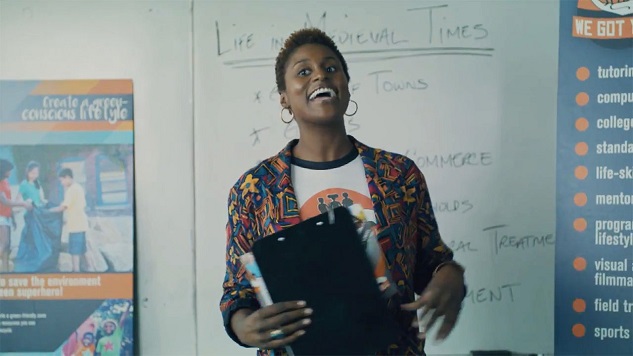 Two of HBO’s best new shows came up through lowly web series. There, an artist with complete control, unfettered by network notes can form a singular creative vision. As it was for “High Maintenance,” so it is with “Insecure” (HBO, 10:30 p.m.), which might end up being the more important of the two simply because it reflects a black woman’s life in her own terms.
Two of HBO’s best new shows came up through lowly web series. There, an artist with complete control, unfettered by network notes can form a singular creative vision. As it was for “High Maintenance,” so it is with “Insecure” (HBO, 10:30 p.m.), which might end up being the more important of the two simply because it reflects a black woman’s life in her own terms.
Issa Rae first got attention with her “Awkward Black Girl,” a piece that couldn’t quite get made into a TV series. But with “Insecure,” whose full name may have been what is now the name of the pilot, “Insecure as F@#$” TV audiences can be introduced to her fresh approach, as a woman who is determined to succeed in a moribund relationship, a perplexing job and occasional inspirations toward rap, while trying to console a friend going through just the same thing.
Comedies about African-Americans have certainly existed before, but all seem to have been watered down a bit. “Insecure,” like Donald Glover’s “Atlanta,” tries more like a Louis C.K comedy, to be closer to the ground and much more authentic. And that all comes from having a voice unfettered.
At the same time there’s no overt political intent to the work — only to accurately reflect life that shockingly goes unreflected on TV most of the time.
As Rae told reporters at the TV Critics Association press tour, “This isn’t a show exclusively about, like, the struggle of being black. It’s not a hood story. It’s not any of those things. It’s just regular black people living life. And HBO has been great about letting us cast who we want to cast; letting us behind the scenes, hire who we want to hire, and … just been really open to taking chances on people and myself included. And I’m just so proud to be able to say that we made the show that we wanted to make.”
Rae says “Insecure” can only help at a time when race relations are again to the fore. “It’s helpful in the way that you watch this and you realize, which is the most basic thing, that black people are human. Black people go through the same experiences as everybody else.”
Aye says the news media tends to suggest “ we are bringing it on ourselves because we tend to be violent by nature, we are constantly approaching the police, or there’s always a narrative that’s against us in a way. And I think with this show, it’s just an opportunity to take our mind off of things but also realize, like, at the end of the day, we are all the same.”